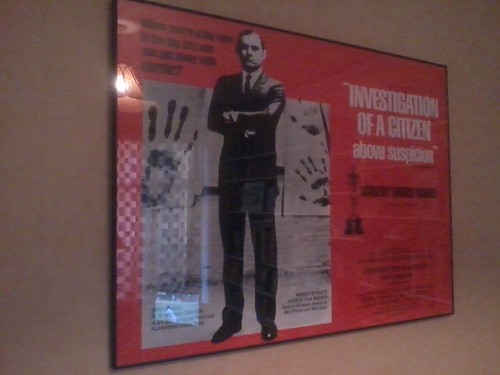Neil Armstrong's death brought up some discussion of the fact that there are almost no photographs of him on the surface of the moon: most of the photography was assigned to Armstrong, so the pictures are of Aldrin, and it's very hard to tell two men in identical spacesuits apart (later missions added red stripes to the Commander's suit to help with identification). Thanks to my misspent youth collecting things to do with astronomy and spaceflight, I do have a copy of one of the photographs identified as Armstrong, so here it is (the NASA designation is AS11-40-5886):
Friday, August 31, 2012
Tuesday, August 28, 2012
Favela Democracy vs. Europe's Last Stalinist Dictatorship
With the Olympics now over, it's safe for me to talk about my own experience of them - going to the Olympic football at Old Trafford. I got the tickets for me and my parents last year, when they were first released, thinking that there would be lots of football tickets and not many people would want them. Also, with Old Trafford so close, it seemed like the obvious thing to do.
You buy the tickets before it's known which teams will be playing, so when the games were finally announced I found out I'd be seeing Egypt vs. New Zealand and Brazil vs. Belarus. Obviously, I was pretty pleased at getting tickets for Brazil, particularly as Brazil use the Olympic team in building their squad for the next World Cup.
We went out to Old Trafford by tram, with plenty of other people going to the same place - including a Brazilian drummer. For future reference, a drum on a tram is only entertaining for the first five minutes, if that. What was interesting to see the array of football shirts and flags being displayed by people outside the ground - not just the teams that were playing, but people from all parts of the world. In what can only be a 21st century development, there were lots of Mancs in Brazil gear, and lots of Brazilians in Manchester United shirts.
Egypt and New Zealand were up first, and even though they were hardly the main attraction, the ground was pretty full for them. It was an entertaining game, set up nicely by the fact that New Zealand scored first, from one of their few attacks. As those who saw New Zealand at the last World Cup will know, they may not have much going forward, but they're tough to break down. And so it proved, although in point of fact the Egyptians had only themselves to blame, carving out masses of opportunities only to indulge in some comically bad finishing. While Egypt did get an equaliser close to the end of the first half, the pattern repeated in the second half, with a late opportunity to win the game badly squandered, to the particular ire of a group of Egyptian fans to my right.
As might be expected, the stadium filled up more for the Brazil game. This included the seats directly behind us, which were occupied by a group of lads who had not turned up for Egypt vs. New Zealand, turned up late to Brazil vs. Belarus, moaned that it was not a premier league match, spent a lot of time talking about how drunk/coked up they were going to get afterwards, went early to/came back late from half time, and left before the end of the match. So they were arseholes, but they were authentic British arseholes, of the type that you can find in any given pub. Room should have been found for them in the opening ceremony.
Belarus continued to play well in the second half, but their attacking threat faded somewhat. Just after the hour-mark Brazil took the lead in a manner which pretty much sums up Brazil, to me: Neymar conned the referee into giving a free-kick just outside the area, then dispatched it brilliantly into the far corner. Belarus still played well, but it was pretty obvious that they weren't going to get back into it. The real Brazil highlight came three minutes into injury time, with Neymar releasing Oscar into the area with a backheel, resulting in a great goal. It was harsh on Belarus, who didn't really deserve to lose by two goals.
This was, I realise now, the only competitive international football I'd ever been to, and I really enjoyed it. Two games for £20 is very good compared to the Premier League, and probably stacks up quite well compared to the more popular Olympic events.
You buy the tickets before it's known which teams will be playing, so when the games were finally announced I found out I'd be seeing Egypt vs. New Zealand and Brazil vs. Belarus. Obviously, I was pretty pleased at getting tickets for Brazil, particularly as Brazil use the Olympic team in building their squad for the next World Cup.
We went out to Old Trafford by tram, with plenty of other people going to the same place - including a Brazilian drummer. For future reference, a drum on a tram is only entertaining for the first five minutes, if that. What was interesting to see the array of football shirts and flags being displayed by people outside the ground - not just the teams that were playing, but people from all parts of the world. In what can only be a 21st century development, there were lots of Mancs in Brazil gear, and lots of Brazilians in Manchester United shirts.
Egypt and New Zealand were up first, and even though they were hardly the main attraction, the ground was pretty full for them. It was an entertaining game, set up nicely by the fact that New Zealand scored first, from one of their few attacks. As those who saw New Zealand at the last World Cup will know, they may not have much going forward, but they're tough to break down. And so it proved, although in point of fact the Egyptians had only themselves to blame, carving out masses of opportunities only to indulge in some comically bad finishing. While Egypt did get an equaliser close to the end of the first half, the pattern repeated in the second half, with a late opportunity to win the game badly squandered, to the particular ire of a group of Egyptian fans to my right.
 |
Egypt on the attack. |
 |
Hulk takes a corner. |
The game itself was great, and was once again made so by the fact that Belarus took an unexpected lead with a great header, which was celebrated by myself with some glee. It was unexpected, but not undeserved: they were playing far better than the Brazil team, with the expensive stars looking like they weren't all that interested. Brazil equalised a few minutes later with a real bullet of a header, but Belarus actually had several other opportunities to score in the first half. My favourite of these was when a Belarusian winger did his level best to replicate the magical 1984 goal John Barnes scored against Brazil, which just failed to come off.
Belarus continued to play well in the second half, but their attacking threat faded somewhat. Just after the hour-mark Brazil took the lead in a manner which pretty much sums up Brazil, to me: Neymar conned the referee into giving a free-kick just outside the area, then dispatched it brilliantly into the far corner. Belarus still played well, but it was pretty obvious that they weren't going to get back into it. The real Brazil highlight came three minutes into injury time, with Neymar releasing Oscar into the area with a backheel, resulting in a great goal. It was harsh on Belarus, who didn't really deserve to lose by two goals.
 |
Free-kick to Brazil. |
After this match, the teams took some surprising paths. From what we'd seen, we expected Belarus to easily beat Egypt and progress to the later stages, but they actually lost 3-1 to them, with Egypt going through. Brazil made the final, as expected, but then lost 1-2 to Mexico (the margin could have been much bigger). I was glad about that: Brazil brought the same arrogant, under-motivated attitude to the final that they had to the game I saw.
This was, I realise now, the only competitive international football I'd ever been to, and I really enjoyed it. Two games for £20 is very good compared to the Premier League, and probably stacks up quite well compared to the more popular Olympic events.
Tuesday, July 31, 2012
The Rise and Fall of Ziggy Stardust and the Spiders from Mars
Till there was rock, you only had God
- David Bowie, "Sweet Head" (1972)
It's also the case that a step-change here, in that while fame was the object of Hunky Dory, here it's very much the subject. Bowie is no longer content to look at fame from the outside, but to examine it at first hand. The major hurdle that had to be overcome was that David Bowie was not famous, and the key realisation was that fame could be constructed and worn, like a mask. One of the things that's so interesting about the whole Ziggy Stardust phenomenon is the role that performativity plays in it: Ziggy Stardust is a rock star because he tells you that he is, and because he does the things that you have come to expect from the cultural script of rock stardom (In 1972 the script was only about 15 years old, which makes it interesting that the Ziggy Stardust character was able to capture the concept so perfectly and prefigure so much of what was to come: in 1972 Elvis had Five Years left).
In some senses what seems most remarkable now is Bowie's decision to kill off the whole Ziggy Stardust mythology after only a year, at the height of his (now real) stardom. In some alternative universe there's a David Bowie who milked it for all he was worth, touring the world with The Spiders from Mars for 5-6 years, and who in 2012 is a mostly-forgotten piece of nostagic kitsch, like Alvin Stardust. The decision to kill off Ziggy was gutsy, and it resulted in Bowie being able to repeatedly change himself, and take an audience with him. Rock stars and identities are ephemeral, and if you've completely created yourself once, you can do it again and again.
Thursday, July 26, 2012
"You don't owe these people any more! You've given them everything!" 'Not everything. Not yet.'
On Sunday I went to see The Dark Knight Rises, before I ended up reading a review or finding out too much about it. My discussion here will CONTAIN SPOILERS, so avoid if you haven't seen the film yet. Also, it'll be a much better read if you know what I'm talking about.
My expectations were high, as I really liked The Dark Knight, but I feel they were fulfilled Getting a superhero film right is notoriously difficult, and the level of difficulty is increased when you've decided to use these archetypes to try and tell a serious story, and give the whole thing enough verisimilitude that you can suspend disbelief about characters like Batman or The Joker existing in what seems very much to be our world. It's a credit to Nolan that he's pulled this off, and has created a film which nicely rounds out the story he wanted to tell.
My favourite of the trilogy is still The Dark Knight, but The Dark Knight Rises is a close second. I feel Batman Begins is easily the weakest of the three. A somewhat weak first film with two good sequels is unusual, but that seems to be what happened.
There are a few comparatively minor things that I don't think completely work in The Dark Knight Rises. Given the running time, more time could have been spent showing us the kinds of inequality in Gotham which allow Bane to take over: as it is, one character tells us that it exists, but we never really get to see it. Similarly, when someone taken to what you've already set up as The Worst Prison In The World, the first thought of the viewer upon seeing it should not be "Oh, that seems all right". Apparently the thing in Room 101 that is the worst thing in the world is Tom Conti talking to you like a kindly uncle, which might be true, but is strange nonetheless.
I'm in two minds about the end. On the one hand, when Chekov's Autopilot finally goes off it seems like a bit of a copout, and makes the line I've used as my title ring a bit hollow. Nolan does deserve credit for making me think that he might actually Kill The Batman, though. Doing that would have left Michael Caine's Alfred with an unhappy ending, but maybe that's part of the price for saving Gotham? The ending which they went with is perfectly good, if perhaps a bit conventional.
Anyway, I really liked it. I still haven't read any reviews, so I can hunt those out and be told why I'm wrong, now.
My expectations were high, as I really liked The Dark Knight, but I feel they were fulfilled Getting a superhero film right is notoriously difficult, and the level of difficulty is increased when you've decided to use these archetypes to try and tell a serious story, and give the whole thing enough verisimilitude that you can suspend disbelief about characters like Batman or The Joker existing in what seems very much to be our world. It's a credit to Nolan that he's pulled this off, and has created a film which nicely rounds out the story he wanted to tell.
My favourite of the trilogy is still The Dark Knight, but The Dark Knight Rises is a close second. I feel Batman Begins is easily the weakest of the three. A somewhat weak first film with two good sequels is unusual, but that seems to be what happened.
There are a few comparatively minor things that I don't think completely work in The Dark Knight Rises. Given the running time, more time could have been spent showing us the kinds of inequality in Gotham which allow Bane to take over: as it is, one character tells us that it exists, but we never really get to see it. Similarly, when someone taken to what you've already set up as The Worst Prison In The World, the first thought of the viewer upon seeing it should not be "Oh, that seems all right". Apparently the thing in Room 101 that is the worst thing in the world is Tom Conti talking to you like a kindly uncle, which might be true, but is strange nonetheless.
I'm in two minds about the end. On the one hand, when Chekov's Autopilot finally goes off it seems like a bit of a copout, and makes the line I've used as my title ring a bit hollow. Nolan does deserve credit for making me think that he might actually Kill The Batman, though. Doing that would have left Michael Caine's Alfred with an unhappy ending, but maybe that's part of the price for saving Gotham? The ending which they went with is perfectly good, if perhaps a bit conventional.
Anyway, I really liked it. I still haven't read any reviews, so I can hunt those out and be told why I'm wrong, now.
Saturday, June 30, 2012
This Year's Present
An original UK quad film poster for Investigation of a Citizen Above Suspicion (1970). It spent 40 years folded up before I got it from Amazon Marketplace. As my dad pointed out, this is probably the first thing I've bought that will get more valuable, although that's not why I bought it.
Monday, June 04, 2012
The Polished Surface of a Desk
From a letter by Raymond Chandler, which I saw on Letters of Note.A long time ago when I was writing for pulps I put into a story a line like "he got out of the car and walked across the sun-drenched sidewalk until the shadow of the awning over the entrance fell across his face like the touch of cool water." They took it out when they published the story. Their readers didn't appreciate this sort of thing: just held up the action. And I set out to prove them wrong. My theory was they just thought they cared nothing about anything but the action; that really, although they didn't know it, they cared very little about the action. The things they really cared about, and that I cared about, were the creation of emotion through dialogue and description; the things they remembered, that haunted them, were not for example that a man got killed, but that in the moment of his death he was trying to pick a paper clip up off the polished surface of a desk, and it kept slipping away from him, so that there was a look of strain on his face and his mouth was half open in a kind of tormented grin, and the last thing in the world he thought about was death. He didn't even hear death knock on the door. That damn little paper clip kept slipping away from his fingers and he just couldn't push it to the edge of the desk and catch it as it fell.
Wednesday, May 23, 2012
Hunky Dory
The fact that "Changes" is the first song on Hunky Dory (1971) is a useful crutch for an unimaginative writer. So here goes: the album represents a remarkable change from The Man Who Sold The World, with the Hard-Rock/Proto-Metal of the latter replaced by the 1970s pop sound of folk-memory. This is the Bowie that starts playing in your head when someone says "David Bowie". This is an album which contains not only "Changes", but also "Life On Mars" and "Oh! You Pretty Things", demonstrating that this is the start of Bowie's most fertile period.
One of the interesting things about reading someone else's opinions on music is that you're suddenly confronted with things you've been mishearing for years. I'm pretty sure that I'm not the only one who thought it was "Turn to face the strain" rather than "Turn to face the strange" on "Changes", although I was perhaps alone in hearing "Now the workers have struck for vain/'cos Lenin's on sale again" rather than "Now the workers have struck for fame/'cos Lennon's on sale again" in "Life on Mars".
While the album represents a change of direction musically, the lyrical themes are very consistent with The Man Who Sold The World: transcending the limits of humanity, occultism (The Nietzschian "Homo Superior" of "Oh! You Pretty Things" is supplemented by a casual reference to Himmler on "Quickand", an early indication as to where the darker part of Bowie's psyche will be heading in a few years), and insanity. This is also an album about fame, and Bowie chooses to wear his influences on his sleeve, with songs explicitly about Andy Warhol and Bob Dylan, and "Queen Bitch" commonly reckoned to be about Lou Reed (although Doggett's book makes a persuasive case for it being a jealous swipe at Marc Bolan's new-found stardom).
So here's the mystery: it's a really good album, with some excellent songs, so why wasn't it a massive success? The single of "Changes" failed to make the Top 40, which is so improbable it makes your head spin. The answer may be the lack of a central strand: all the elements of Bowie's success are here, but there's a lack of a central something to make the diverse elements come together cohesively.
But something is coming...
One of the interesting things about reading someone else's opinions on music is that you're suddenly confronted with things you've been mishearing for years. I'm pretty sure that I'm not the only one who thought it was "Turn to face the strain" rather than "Turn to face the strange" on "Changes", although I was perhaps alone in hearing "Now the workers have struck for vain/'cos Lenin's on sale again" rather than "Now the workers have struck for fame/'cos Lennon's on sale again" in "Life on Mars".
While the album represents a change of direction musically, the lyrical themes are very consistent with The Man Who Sold The World: transcending the limits of humanity, occultism (The Nietzschian "Homo Superior" of "Oh! You Pretty Things" is supplemented by a casual reference to Himmler on "Quickand", an early indication as to where the darker part of Bowie's psyche will be heading in a few years), and insanity. This is also an album about fame, and Bowie chooses to wear his influences on his sleeve, with songs explicitly about Andy Warhol and Bob Dylan, and "Queen Bitch" commonly reckoned to be about Lou Reed (although Doggett's book makes a persuasive case for it being a jealous swipe at Marc Bolan's new-found stardom).
So here's the mystery: it's a really good album, with some excellent songs, so why wasn't it a massive success? The single of "Changes" failed to make the Top 40, which is so improbable it makes your head spin. The answer may be the lack of a central strand: all the elements of Bowie's success are here, but there's a lack of a central something to make the diverse elements come together cohesively.
But something is coming...
Sunday, May 13, 2012
Thursday, March 15, 2012
The Merry Widow
The hundred million self-confident German masters were to be brutally installed in Europe, and secured in power by a monopoly of technical civilisation and the slave-labour of a dwindling native population of neglected, diseased, illiterate cretins, in order that they might have leisure to buzz along infinite Autobahnen, admire the Strength-Through-Joy Hostel, the Party headquarters, the Military Museum and the Planetarium which their Fuhrer would have built in Linz (his new Hitleropolis), trot round local picture-galleries, and listen over their cream buns to endless recordings of The Merry Widow. This was to be the German Millennium, from which even the imagination was to have no means of escape.
- Hugh Trevor-Roper, The Mind of Adolf Hitler (1953)
The Guardian's acquisition of Bashar and Asma al-Assad's emails makes me wonder if anyone's ever done a sociological analysis of the material culture choices made by dictators. The Assads, like Hitler, seem to go for a fairly straightforward bourgeois consumerism - a banality of culture to go alongside the banality of evil. Gaddafi, meanwhile, went for the full-on Tony-Montana-in-Scarface aesthetic. Further datapoints are required to spin the concept out to book-length, of course.
Thursday, March 08, 2012
The Condition of Stockport
There is Stockport, too, which lies on the Cheshire side of the Mersey, but belongs nevertheless to the manufacturing district of Manchester. It lies in a narrow valley along the Mersey, so that the streets slope down a steep hill on one side and up an equally steep one on the other, while the railway from Manchester to Birmingham passes over a high viaduct above the city and the whole valley. Stockport is renowned throughout the entire district as one of the duskiest, smokiest holes, and looks, indeed, especially when viewed from the viaduct, excessively repellent. But far more repulsive are the cottages and cellar dwellings of the working-class, which stretch in long rows through all parts of the town from the valley bottom to the crest of the hill. I do not remember to have seen so many cellars used as dwellings in any other town of this district.
- Friedrich Engels, The Condition of the Working Class in England (1845)
You have to wonder what he'd make of Merseyway, a piece of Le Corbusier-esque High Modernism which is increasingly inhabited by pawnbrokers shops. On the other hand, the description of it that I just gave tells you pretty much everything you need to know.
Wednesday, February 22, 2012
The Man Who Sold The World
This is the first of my pieces on David Bowie's 1970s albums, which I'm listening to and simultaneously reading about in Peter Doggett's book The Man Who Sold The World: David Bowie and the 1970s.
To someone who's main exposure to Bowie has been through singles compilations, this album, recorded in 1970, is something of a surprise. The glam-rock which made Bowie's name had yet to arrive, and we find ourselves very much at the tail end of the 1960s scene. The themes which would become Bowie trademarks: sexuality ("The Width of a Circle", "She Shook Me Cold"), violence ("Running Gun Blues"), madness ("All The Madmen"), the occult ("The Supermen") and dystopian futures ("Saviour Machine") are all present. The melodies themselves, however, are very much in the psychedelic rock/hard rock/acid rock/heavy rock which is pretty standard for the time. Going by Doggett's account, Bowie was never fully invested in the album, and much of it was created by other members of the production team
The one exception to this is the title track, which looks back in capturing something of the alienated deep-space chill of Bowie's only previous hit single "Space Oddity" (1969), and fits with the Bowie of the future in that it demonstrates his ability to give you something which sounds like nothing you've heard before. It's perhaps also the only song on the album in which the melody really matches the lyrical content. The latter is perhaps the bleakest thing this album has to offer, acting as a prescient commentary on the 1960s counter-culture, and perhaps on Bowie's fears about himself and his identity: everything you believe in is going to be sold out - and you're going to be the one who does it. Troubling stuff for someone who was only 23 when this was written and recorded, but we all have our moments.
So, this isn't destined to be one of my favourite albums, but it's an interesting look at the background from which Bowie's most successful period emerged. Next up: Hunky Dory.
To someone who's main exposure to Bowie has been through singles compilations, this album, recorded in 1970, is something of a surprise. The glam-rock which made Bowie's name had yet to arrive, and we find ourselves very much at the tail end of the 1960s scene. The themes which would become Bowie trademarks: sexuality ("The Width of a Circle", "She Shook Me Cold"), violence ("Running Gun Blues"), madness ("All The Madmen"), the occult ("The Supermen") and dystopian futures ("Saviour Machine") are all present. The melodies themselves, however, are very much in the psychedelic rock/hard rock/acid rock/heavy rock which is pretty standard for the time. Going by Doggett's account, Bowie was never fully invested in the album, and much of it was created by other members of the production team
The one exception to this is the title track, which looks back in capturing something of the alienated deep-space chill of Bowie's only previous hit single "Space Oddity" (1969), and fits with the Bowie of the future in that it demonstrates his ability to give you something which sounds like nothing you've heard before. It's perhaps also the only song on the album in which the melody really matches the lyrical content. The latter is perhaps the bleakest thing this album has to offer, acting as a prescient commentary on the 1960s counter-culture, and perhaps on Bowie's fears about himself and his identity: everything you believe in is going to be sold out - and you're going to be the one who does it. Troubling stuff for someone who was only 23 when this was written and recorded, but we all have our moments.
So, this isn't destined to be one of my favourite albums, but it's an interesting look at the background from which Bowie's most successful period emerged. Next up: Hunky Dory.
Thursday, February 02, 2012
Tuesday, January 17, 2012
1980s Science-Fiction Was Never Knowingly Under-Bleak
1995
After a period of increasing tension and escalating border incidents, full-scale war erupted between the Soviet Union and the People's Republic of China.
...
On October 7th, 1996, the Bundeswehr crossed the border between East and West Germany and began attacking Soviet garrison units still in the country.
...
While the political leadership of the European members of NATO debated the prudence of intervention, the U.S. army crossed the frontier.
...
1997
...On July 9th, with advanced elements of the 1st German Army on Soviet soil, the Red Army began using tactical nuclear weapons.
...
1998
The winter of 1997-98 was particularly cold. Civilian war casualties in the industrialized nations had reached almost 15% by the turn of the year, but the worst was yet to come. Communication and transportation systems were non-existent, and food distribution was impossible. In the wake of nuclear war came famine on a scale previously undreamed of...Plague, typhoid, cholera, typhus, and many other diseases swept the world's population. By the time they had run their courses, the global casualty rate would be 50%.
- Twilight: 2000 Referee's Manual (1984)
I downloaded the pdf of this a few years ago as part of an RPG Day promotion. It's eerie to think that people were sitting down to play this game at a time when the above seemed like a future that was more likely than not. The suggested campaign is pretty interesting, being Xenophon's Anabasis transposed to post-nuclear central Europe. If I can ever get a group together, I may even run it. I probably wouldn't use the original rules, as they're a bit too early 80s for me. I could probably kitbash something together based on Reign, though.
Tuesday, January 03, 2012
An Experiment With An Artist
Bowie, in particular, in a series of 'camp' incarnations (Ziggy Stardust, Aladdin Sane, Mr Newton, the thin white duke, and more depressingly the Blond Fuehrer) achieved something of a cult status in the early 70s. He attracted a mass youth (rather than teeny-bopper) audience and set up a number of visual precedents in terms of personal appearance (make-up, dyed hair, etc.) which created a new sexually ambiguous image for those youngsters willing and brave enough to challenge the notoriously pedestrian stereotypes conventionally available to working-class men and women. Every Bowie concert performed in drab provincial cinemas and Victorian town halls attracted a host of startling Bowie lookalikes, self-consciously cool under gangster hats which concealed (at least until the doors were opened) hair rinsed a luminous vermilion, orange, or scarlet streaked with gold and silver.
- Dick Hebdige, Subculture: The meaning of style (1979)
According to Wikipedia, one of those drab provincial cinema gigs was in my manor, just by where I went to secondary school. While I've been into Bowie for quite a long time now, my knowledge of his music comes pretty much entirely from radio play and singles collections - I know almost nothing about the albums, although some of them have excellent reputations.
For Christmas I got a copy of Peter Doggett's recent book The Man Who Sold The World: David Bowie and the 1970s, and copies of "The Man Who Sold The World" (1970) and "Hunky Dory" (1971). My plan is to listen to the albums as I read the relevant sections of the book. I may even blog about it here as I do it, although I'm pretty sure people have done that before.
Monday, December 19, 2011
I Survived The Great Stockport Tornado
I haven't been posting much recently, mostly because I've been working three different part-time jobs (two lecturing, one note-taking), and apart from the time spent travelling to them and doing them, I haven't been up to much other than writing lectures.
A couple of weeks ago a tornado happened in Stockport. More than that, it happened in Heaton Moor, just as I was walking home from the station. I didn't actually realise what was happening at the time, just that it was a bit windy and raining hard. The next day, the local news were interviewing a fireman clearing up some of the debris when he said that "Some people are saying it's like Armageddon". Really? What people? Where?
Above: Armageddon.
Saturday, October 29, 2011
Thursday, October 20, 2011
A Bullet For The Colonel
So Gadaffi's dead, which was kind of predictable. While I'd much rather have seen him in the dock at the ICC, it's probably much more fun shouting "SIC SEMPER TYRANNIS!" than "WE NEED AN EQUITABLE AND ROBUST SYSTEM OF INTERNATIONAL JUSTICE!"
And now the really hard bit starts in Libya...
And now the really hard bit starts in Libya...
Sunday, September 18, 2011
Wednesday, September 07, 2011
Wednesday, August 31, 2011
99 Problems, But A Pitch Ain't One
Edgeley Park from the Cheadle Stand. Note comedy head accidentally photobombing in the lower right.
It's a long time since I went to watch Stockport County. Despite them being my local club, the first football match I ever attended was Fulham away at Chester City in 1996. The second match I attended was Stockport, though, and I went quite a few times during my last year at school and my two years of Sixth-Form College. Those were probably the best years that Stockport have ever had, with players like Alun Armstrong, Mike Flynn, Jim Gannon, Sean Connelly, and Kevin Cooper. In the spring of 1998 I saw them finish 8th in the Championship, two places outside the playoffs for the Premier League.
Things are rather different now - last season saw them relegated out of the League for the first time since 1905. This seemed like a good time to return, so a couple of weeks ago me and my Dad went to see them at home to Ebbsfleet United. I confess to no longer knowing who's who in the Stockport squad - the most familiar name is new manager Dietmar Hamann, the former Liverpool and Germany player.
The game itself was good. While Stockport played the better football, they didn't create many chances - the more direct approach of Ebbsfleet was much more effective, and they were slightly unfortunate not to be at least a goal up at half-time. In the second half, however, Stockport created far more chances, with a string of crosses low across the box from the right going unfinished in increasingly comic/frustrating fashion. Eventually the pressure told, Chadwick heading home from close range after yet another break down the right. That was about 20 minutes from the end, but unfortunately Stockport conceded a soft goal from a set-piece about 10 minutes later, perhaps having lost concentration due to an attempted substitution. While there were more chances for Stockport, none were serious, and the game ended in a 1-1 draw. This was disappointing in that Stockport should really have won easily, but the point put them just outside the playoff places.
Subscribe to:
Posts (Atom)










